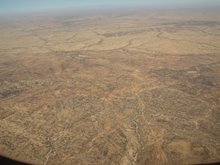The world is waiting on Darfur. It is expected that UN peacekeepers, under the heavy package deal agreed with Khartoum, will be dispatched soon. It is believed that their presence will substantially reduce violence between rebel and government forces. It is believed that they will protect the displaced and the defenceless from Janjaweed raids. Finally, and perhaps most dangerously, it is believed that their presence will create the conditions for a post-Abuja political settlement and the deployment of large UN-AU hybrid force. In other words, it is assumed that the deployment of UN forces is the first step towards a sustainable and equitable peace in Darfur.
But what will happen if these assumptions are false, or worse are merely political theatre designed to pacify the street rallies calling for 'something' to be done.
Today in Darfur fighting between rebels and government has almost ceased. Instead we are confronted with a complex layer cake of localised conflicts and banditry. This situation is certainly lethal for Darfur’s residents but it is equally treacherous for any outside force, unlikely to understand the highly localised conflicts currently raging in Darfur. Look at the current international force in Darfur: April has been the deadliest month for the African Union since their deployment, with seven soldiers killed in three attacks. Five it is believed were killed by gun-men from one of the rebel factions.
The failures of the AU are blamed on their expertise and capacity, which are certainly limited. But what if the reality is that no military force, regardless of mandate or capacity can end this conflict, what role will peacekeepers then serve?
Instead of bringing stability to Darfur, there is a real danger than any new peacekeeping force will upset the delicate balances of power that have brought a measure of stability to certain areas of Darfur and trigger new violence both against itself and against the population. The current situation in Darfur has been created by Khartoum. Its decisions in 2004 to pull police and military forces out of rural areas and to arm the Janjaweed militia has cost the lives of hundreds of thousands, and left millions destitute. However, Khartoum’s decision was not to fight a war by other means but, particularly since its massive defeats during the September campaign of 2006, it was to make Darfur ungovernable by any party. It chose to create a hell that neither it nor any one could control. Since it achieved this it has sat and watched Darfur burn. At present Khartoum has the strategic upperhand - it has checked the rebels advance - hence there apparent willingness to bend to international pressure at the moment. But it has lost tactical control on the ground, and the danger is that it the UN peacekeepers will be forced to play this role as they seek to protect civilians and humanitarian agencies alike. Thus, they will be doing the government's work.
Peacekeepers were necessary in 2003 and in 2004. They were necessary in 2005 and probably in 2006. But we are too late. ‘Never again’ has become, ‘once again’. We must not compile our mistakes with another. Introducing UN peacekeepers into Darfur is a fools errand. To bring security in the middle of any war, normally means consolidating the authority of the actors that are already present – at present the dominant actor is the government in Khartoum. Peacekeepers faced with a baffling array of rebel groups, factions and militia risk seeking support from the one actor able to offer it, the government. The only solution now of any real effectiveness is to unify the rebels, pressure Khartoum to protect its citizens, and strengthen the African Union.
This is not a good choice, in fact it is a hard, dirty and unpleasant choice. But politics is not about good choices. It is about recognising and taking possibilities. We must not let our dreams cost lives.
Subscribe to:
Post Comments (Atom)

No comments:
Post a Comment